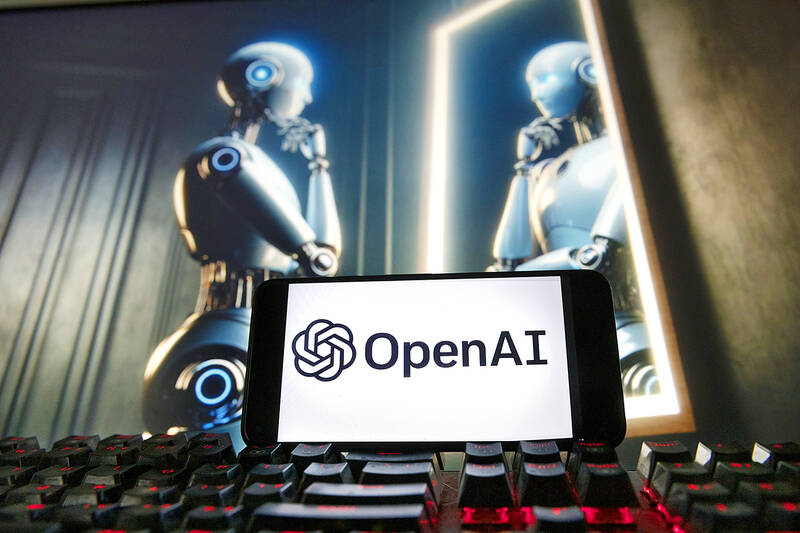OpenAI on Friday said that it has disbanded a team devoted to mitigating the long-term dangers of super-smart artificial intelligence (AI).
It began dissolving the so-called “superalignment” group weeks ago, integrating members into other projects and research, the San Francisco-based firm said.
OpenAI co-founder Ilya Sutskever and team coleader Jan Leike announced their departures from the company during the week.

Photo: Michael Dwyer, AP
The dismantling of a team focused on keeping sophisticated AI under control comes as such technology faces increased scrutiny from regulators and fears mount regarding its dangers.
“OpenAI must become a safety-first AGI [artificial general intelligence] company,” Leike wrote on X on Friday.
Leike called on all OpenAI employees to “act with the gravitas” warranted by what they are building.
OpenAI CEO Sam Altman responded to Leike’s post with one of his own.
Altman thanked Leike for his work at the company and said he was sad to see him leave.
“He’s right, we have a lot more to do,” Altman said. “We are committed to doing it.”
Altman promised more on the topic in the coming days.
Sutskever said on X that he was leaving after almost a decade at OpenAI, the trajectory of which “has been nothing short of miraculous.”
“I’m confident that OpenAI will build AGI that is both safe and beneficial,” he added, referring to computer technology that seeks to perform as well as — or better than — human cognition.
Sutskever, who is also OpenAI’s chief scientist, sat on the board that voted to remove Altman in November last year.
The ousting threw the company into a tumult, as staff and investors rebelled.
The OpenAI board ended up hiring Altman back a few days later.
OpenAI earlier last week released a higher-performing and even more human-like version of the AI technology that underpins ChatGPT, which was made free to all users.
“It feels like AI from the movies,” Altman said in a blog post.
Altman has previously pointed to Scarlett Johansson’s character in the movie Her, where she voices an AI-based virtual assistant dating a man, as an inspiration for where he would like AI interactions to go.
The day would come when “digital brains will become as good and even better than our own,” Sutskever said at a talk during a TED AI summit in San Francisco late last year.
“AGI will have a dramatic impact on every area of life,” Sutskever added.

Intel Corp chief executive officer Lip-Bu Tan (陳立武) is expected to meet with Taiwanese suppliers next month in conjunction with the opening of the Computex Taipei trade show, supply chain sources said on Monday. The visit, the first for Tan to Taiwan since assuming his new post last month, would be aimed at enhancing Intel’s ties with suppliers in Taiwan as he attempts to help turn around the struggling US chipmaker, the sources said. Tan is to hold a banquet to celebrate Intel’s 40-year presence in Taiwan before Computex opens on May 20 and invite dozens of Taiwanese suppliers to exchange views

Application-specific integrated circuit designer Faraday Technology Corp (智原) yesterday said that although revenue this quarter would decline 30 percent from last quarter, it retained its full-year forecast of revenue growth of 100 percent. The company attributed the quarterly drop to a slowdown in customers’ production of chips using Faraday’s advanced packaging technology. The company is still confident about its revenue growth this year, given its strong “design-win” — or the projects it won to help customers design their chips, Faraday president Steve Wang (王國雍) told an online earnings conference. “The design-win this year is better than we expected. We believe we will win

Chizuko Kimura has become the first female sushi chef in the world to win a Michelin star, fulfilling a promise she made to her dying husband to continue his legacy. The 54-year-old Japanese chef regained the Michelin star her late husband, Shunei Kimura, won three years ago for their Sushi Shunei restaurant in Paris. For Shunei Kimura, the star was a dream come true. However, the joy was short-lived. He died from cancer just three months later in June 2022. He was 65. The following year, the restaurant in the heart of Montmartre lost its star rating. Chizuko Kimura insisted that the new star is still down

While China’s leaders use their economic and political might to fight US President Donald Trump’s trade war “to the end,” its army of social media soldiers are embarking on a more humorous campaign online. Trump’s tariff blitz has seen Washington and Beijing impose eye-watering duties on imports from the other, fanning a standoff between the economic superpowers that has sparked global recession fears and sent markets into a tailspin. Trump says his policy is a response to years of being “ripped off” by other countries and aims to bring manufacturing to the US, forcing companies to employ US workers. However, China’s online warriors